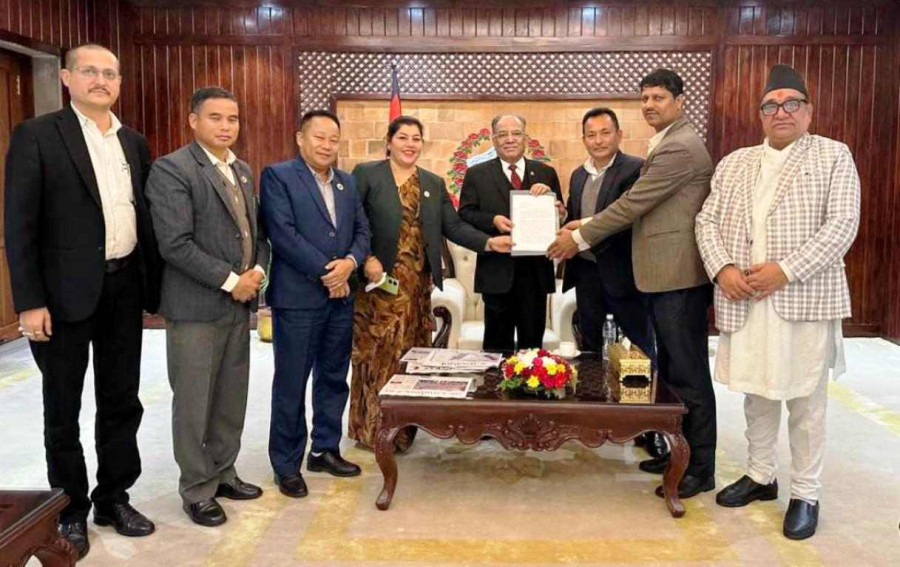Politics
Seven provinces submit their demands to Prime Minister Dahal
Dahal promises a decision upon his return from the UN climate summit in the first week next month.
Post Report
Internal affairs ministers of the seven provinces met Prime Minister Pushpa Kamal Dahal on Tuesday and threatened to launch protests if his government continued to delay the adjustment of the police force and enactment of the federal civil service law.
The ministers from the ruling alliance gathered in Kathmandu to express their collective voice before the federal government following its reluctance to implement similar demands by Madhesh.
"The prime minister has said he has taken our demands positively," Mohammad Samim, the internal affairs minister of Madhesh, told the Post. "We are optimistic that our demands will be addressed within the deadline."
On November 9, a team of all-party representatives from Madhesh Province had issued a 30-day ultimatum to Dahal to address their six-point demand, warning of a protest if Kathmandu continued to delay the decisions necessary for a full-fledged implementation of federalism.
The team led by Saroj Kumar Yadav, chief minister of Madhesh, also threatened to launch a Kathmandu-centric protest if the issues related to the devolution of authorities enshrined in the 2015 constitution are not sorted within the deadline. The deadline ends on December 8.
Prior to meeting Dahal, the seven ministers presented their demands to Deputy Prime Minister and Minister for Home Affairs Narayan Kaji Shrestha, who also said he was serious about the demands of the provincial governments.
Santosh Kumar Pandey, internal affairs minister of Lumbini Province, said Dahal told them that a formal decision will be taken after he returns from the UN climate conference (COP 28) in Dubai, UAE, starting November 30. Dahal will embark on his five-day visit on Wednesday.
"We have been told that the respective ministries will continue homework until the prime minister returns. The cabinet will take a decision after he is back," Pandey told the Post.
Though the federal parliament in August 2019 endorsed the Police Personnel Adjustment Bill and the Bill to Govern the Operation, Supervision and Coordination of Nepal Police and Provincial Police Forces, the federal government has been hesitant to adjust the police at the provincial level. The adjustment Act authorises the federal government to assign a deputy inspector general (DIG) of Nepal Police to serve as the police chief of a province.
The federal government can transfer such police officers to other provinces or any department of Nepal Police in consultation with provincial governments.
However, in case of other personnel adjusted to provincial police forces, the relevant provincial official can transfer such personnel to any police unit within the province. Ignoring repeated demands of the provinces, successive federal governments have left the Act unimplemented.
These governments also paid little attention to the passage of the Federal Civil Service Act. The incumbent government has yet to draft a bill to address the provinces’ demands.
The provincial governments say the federal government should issue the law through an ordinance if it is not possible to get it endorsed through the federal parliament immediately. The federal parliament is currently not in session.
Eight years since the promulgation of the Constitution of Nepal, the Civil Service Act is yet to be promulgated. The explicit responsibility to manage provincial police administration and provincial civil service rests with the provincial governments, as per the constitution.
The provincial governments have been complaining that they have not been able to work effectively in the absence of their own police force and civil servants. After continued indifference by the federal government, a meeting of the internal affairs ministers from the seven provinces held in Chitwan on Thursday and Friday concluded that the provinces needed to exert collective pressure on the federal government.
"All the provinces are together because this is our common problem. We have decided to continue exerting pressure until we get our constitutional authority," said Samim. "We have been hearing that provinces haven't been able to perform effectively. But how can we run when our legs are tied? No police and civil servants means the provinces are left at the mercy of the federal government."
Though the provinces are claiming they are in a decisive fight, this is not the first time the provinces have organised against the centre to assert their constitutional rights. In an attempt to press the federal government on police adjustment and to resolve issues related to civil servants, internal affairs ministers of the seven provinces had issued a seven-point demand in July last year.
The Madhesh provincial leaders had also presented a memorandum to the earlier government led by Sher Bahadur Deuba. The chief minister and ministers even staged sit-in protests at their offices, to little effect. But the memorandum was later withdrawn.




 18.12°C Kathmandu
18.12°C Kathmandu














